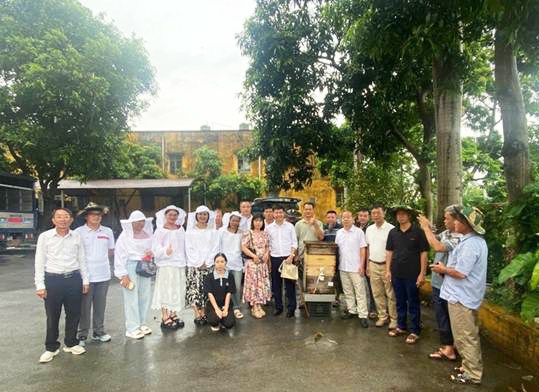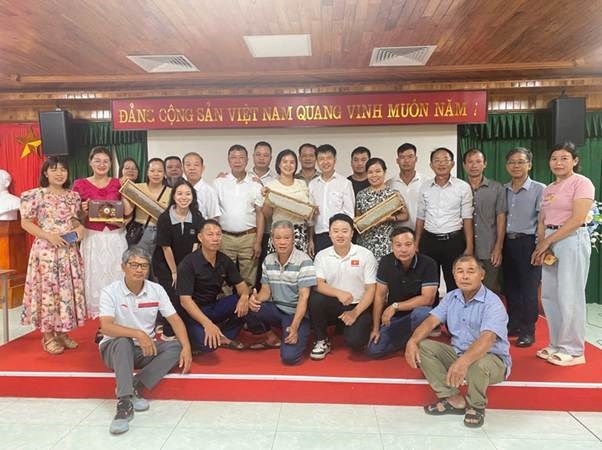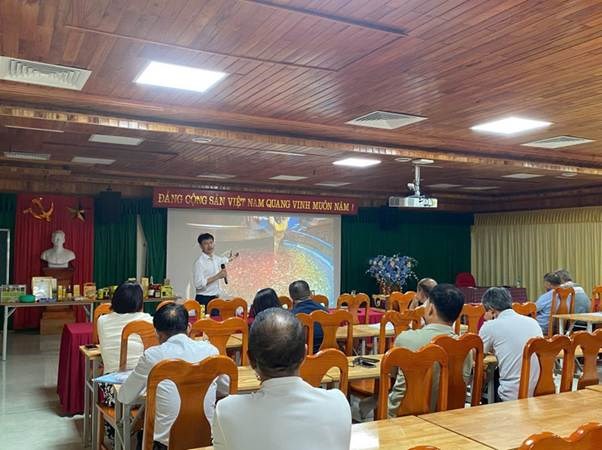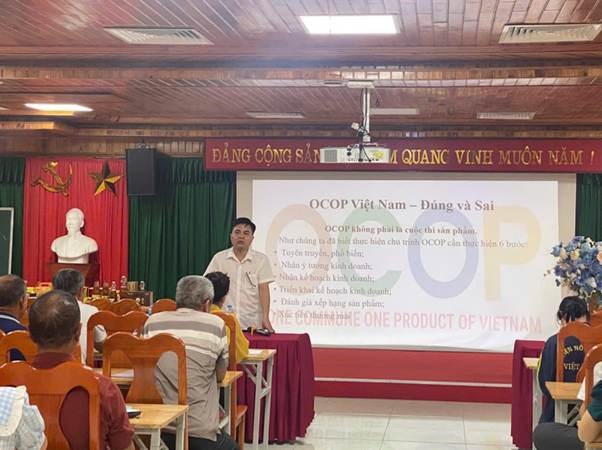To help beekeepers access advanced technical procedures, improve productivity, and enhance honey quality, the OCOP honey training program had been organized in many localities across the country.

Participants after the training on beekeeping techniques and honey harvesting using super hives to improve the quality of OCOP honey products.
According to the Center for Honeybee Research and Tropical Beekeeping, Vietnam National University of Agriculture (VNUA), the training program on honey-based product development aimed at creating nationally recognized OCOP products. The goal was to support product standardization and apply traceability systems to increase value and expand potential markets.
In Bac Ninh, the Center for Honeybee Research and Tropical Beekeeping, VNUA, recently organized a training course for OCOP honey stakeholders, including beekeeping households, cooperatives, and facilities from Bac Ninh, Cao Bang, Lang Son, Thai Nguyen, and Quang Ninh provinces.
Enhancing OCOP Honey Quality through the Super Hive Model
The Center for Honeybee Research and Tropical Beekeeping, VNUA, was the country’s leading institution in researching and transferring beekeeping technologies to farmers. It also developed applications for management and traceability to ensure quality and maintain breed supply.

Assoc. Prof. Dr. Pham Hong Thai with participants of the training program.
Assoc. Prof. Dr. Pham Hong Thai, Director of the Center, stated that the training focused on using super hives to optimize the bees’ living environment, manage colonies by growth stage, rear queens, expand colonies, supplement natural feed, and prevent diseases.
Unlike traditional single-hive beekeeping, the super hive system provides a separate space for the queen to lay eggs and rear larvae, while honey is stored in the super hives. This method enables harvesting of fully ripened honey with low water content, free from larvae residues, thus improving quality compared to honey harvested from single hives.
In addition to centrifuged honey, this method allows for the production of comb honey, a highly sought-after product that sells at higher prices. Although investment in super hives and frames is higher, the return is superior, including better quality, higher value, optimal colony development, easier inspection, reduced disturbance during harvesting, and food safety assurance.
The training program also provided knowledge on site selection, colony management across seasons, honey harvesting and product diversification, parasite prevention, and updates on regulations, quality standards, and market requirements.
Bac Ninh was chosen as a pilot site to demonstrate the effectiveness of transitioning from single hives to super hives, resulting in improved productivity and quality.

According to Assoc. Prof. Dr. Pham Hong Thai, the super hive model has been successfully piloted in several provinces, producing purer honey that meets strict market requirements.
According to Assoc.Prof.Dr. Pham Hong Thai, the model had been successfully tested in provinces such as Nghe An, Son La, and Kien Giang, producing purer honey by removing pollen, larvae residues, and reducing water content to meet strict quality demands.
Standardizing Products and Strengthening the OCOP Brand
Bac Ninh, Cao Bang, Lang Son, Thai Nguyen, and Quang Ninh were the provinces which were rich in traditional and specialty products. Linking production with the National Target Program on New Rural Development had created favorable conditions for forming and upgrading OCOP products, including beekeeping.
With advantages in fruit orchards and abundant nectar sources, many localities had developed stable bee populations and expanded production scale.
Previously, beekeeping was mostly spontaneous and small-scale. Now, most households had shifted to concentrated models with dozens of local bee colonies and hundreds of imported colonies, rapidly spreading across communes.

Consultant Dr. Nguyen Thanh Phong, VNUA, provides sharing on the application of technology to develop honey products meeting OCOP standards.
Consultant Dr. Nguyen Thanh Phong, VNUA, emphasized that developing honey products aligned with OCOP standards enhances value and competitiveness. Beekeeping cooperatives play a central role in technology transfer, production linkage, and product marketing.
At the Bac Ninh training course, experts guided participants to standardize products based on three main criteria, including quality, certification and quality declaration, and packaging/labeling. Supportive measures included local development policies, funding, and the application of science and technology.
According to Mr. Do Van Huy, Vice Head of the Operations Office and in charge of the OCOP program at the Bac Ninh Sub-Department of Cooperative Economy and Rural Development, the domestic market was increasingly diversified with honey products featuring attractive packaging and labels, contributing to enhanced consumption.

Mr. Do Van Huy, Vice Head of the Operations Office in charge of the OCOP program, Bac Ninh Sub-Department of Cooperative Economy and Rural Development, introduces the OCOP product program.
For many years, technical agencies and localities had organized training, provided consultations on packaging design and dossier preparation for the products registering for OCOP certification. In practice, certified products sell better, with increased value and profitability.
Additionally, participants were provided training on declaring quality standards, labeling, preparing OCOP evaluation dossiers, implementing product traceability, and complying with national honey safety standards, including veterinary drug residue limits for honey products.
The Ministry of Agriculture and Environment issued various guidelines requiring that products could only enter the market after registering quality with authorities. In the context of counterfeit and fake products, attaching traceability codes to OCOP products became crucial. It authenticated product value, enhanced brand reputation, protected consumers, and created a transparent foundation to expand markets.